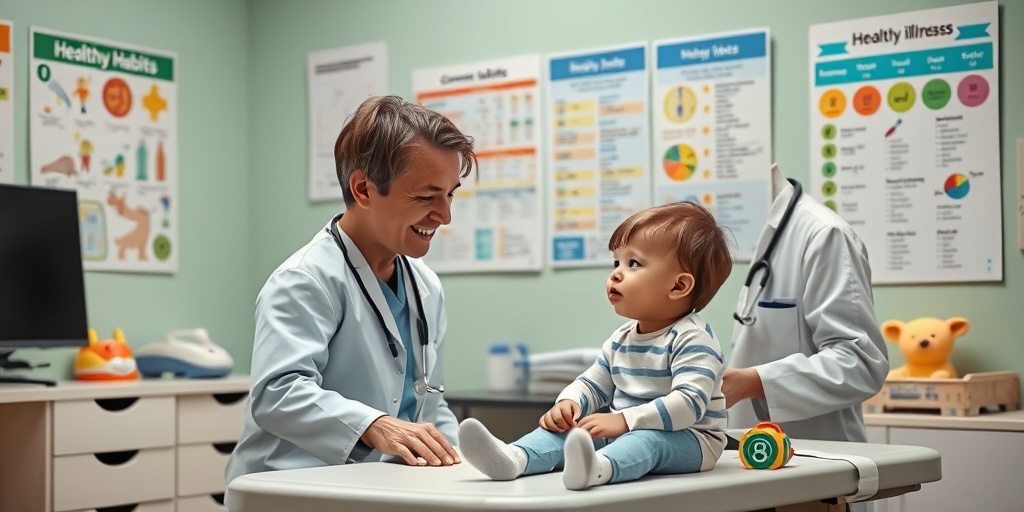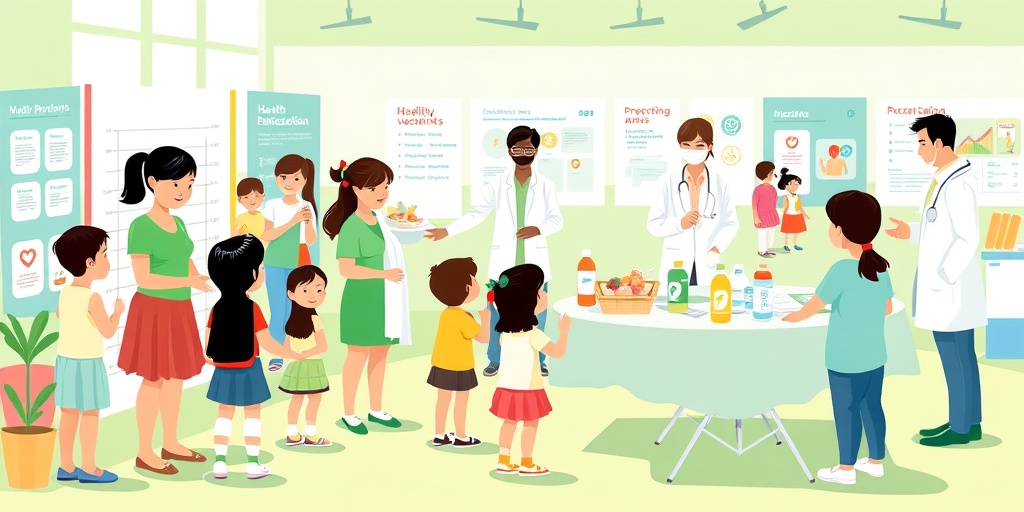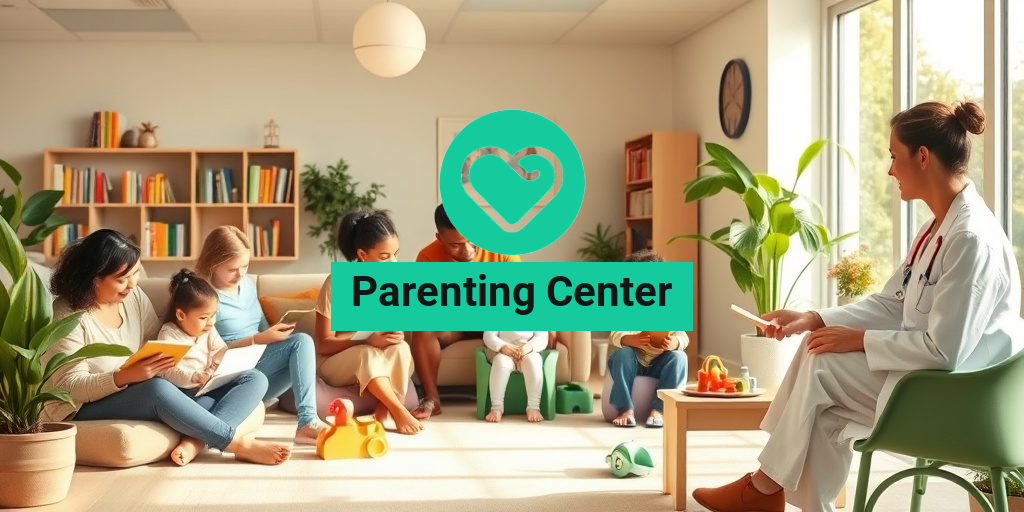Understanding Child Health
As parents, understanding child health is crucial for ensuring the well-being of our little ones. A Parenting Center can be an invaluable resource in this journey, providing guidance, support, and education on various aspects of child health. From nutrition to mental well-being, being informed can help you make the best decisions for your child’s development.
The Importance of Regular Check-Ups
Regular health check-ups are essential for monitoring your child’s growth and development. These visits allow healthcare providers to:
- Assess physical growth and development milestones
- Administer vaccinations to prevent diseases
- Identify any potential health issues early on
By staying proactive with your child’s health, you can ensure they are on the right track and address any concerns before they become significant issues.
Nutritional Needs for Growing Kids
Nutrition plays a vital role in a child’s health. A balanced diet rich in fruits, vegetables, whole grains, and proteins is essential for their growth and development. Here are some tips to ensure your child is getting the nutrients they need:
- Encourage Variety: Offer a wide range of foods to expose your child to different flavors and nutrients.
- Limit Sugary Snacks: While treats are okay in moderation, try to limit sugary snacks and drinks to promote better health.
- Involve Them in Cooking: Get your child involved in meal preparation to teach them about healthy eating habits.
For more detailed nutritional guidelines, consider visiting resources like Yesil Health AI, which provides evidence-based health answers tailored for families.
Mental Health Matters
Just as physical health is important, so is mental health. Children can experience stress, anxiety, and other emotional challenges. Here are some ways to support your child’s mental well-being:
- Open Communication: Encourage your child to express their feelings and thoughts openly.
- Establish Routines: Consistent daily routines can provide a sense of security and stability.
- Promote Play: Playtime is essential for children to explore their emotions and socialize with peers.
By fostering a supportive environment, you can help your child navigate their emotions and develop resilience.
Common Childhood Illnesses
As children grow, they may encounter various illnesses. Understanding these common childhood illnesses can help you recognize symptoms and seek appropriate care. Here are some of the most prevalent conditions:
Colds and Flu
Colds and flu are among the most common illnesses in children. Symptoms often include:
- Runny or stuffy nose
- Coughing
- Fever
- Fatigue
While most colds resolve on their own, it’s essential to monitor your child’s symptoms and consult a healthcare provider if they worsen.
Ear Infections
Ear infections are particularly common in young children. Signs may include:
- Pain in the ear
- Difficulty sleeping
- Fever
If you suspect your child has an ear infection, it’s crucial to seek medical advice, as they may require antibiotics.
Gastroenteritis
Also known as the stomach flu, gastroenteritis can cause vomiting and diarrhea. It’s often viral and can spread easily among children. To manage symptoms:
- Ensure your child stays hydrated
- Offer bland foods as they recover
Consult a healthcare provider if symptoms persist or worsen.
Allergies
Food allergies and seasonal allergies can significantly impact a child’s quality of life. Common symptoms include:
- Itchy eyes or skin
- Swelling
- Respiratory issues
If you suspect your child has allergies, consider visiting a Parenting Center for guidance on management and treatment options.
In conclusion, understanding child health and being aware of common illnesses can empower parents to take proactive steps in caring for their children. Utilizing resources like a Parenting Center and platforms such as Yesil Health AI can provide valuable support and information. Remember, a healthy child is a happy child! 🌟

Signs of Illness in Kids
As a parent, it can be challenging to determine when your child is unwell. Children often cannot articulate their feelings, making it essential to recognize the signs of illness. Here are some common indicators that your little one may be under the weather.
Changes in Behavior
One of the first signs that something might be wrong is a noticeable change in your child’s behavior. If your usually energetic child becomes unusually lethargic or irritable, it could be a sign of illness. Pay attention to:
- Increased fussiness or crying
- Withdrawal from activities they usually enjoy
- Changes in sleep patterns, such as sleeping more or less than usual
Physical Symptoms
Physical symptoms can also provide clues about your child’s health. Look for:
- Fever: A temperature above 100.4°F (38°C) is often a sign of infection.
- Coughing or sneezing: Persistent coughs or sneezes can indicate respiratory issues.
- Rashes: Skin rashes can be a sign of various conditions, from allergies to infections.
- Vomiting or diarrhea: These symptoms can lead to dehydration, so monitor your child closely.
Changes in Appetite
A sudden change in appetite can also signal that your child is not feeling well. If your child refuses to eat or drink, it’s essential to investigate further. Dehydration can occur quickly in children, so ensure they are getting enough fluids, especially if they are experiencing vomiting or diarrhea.
Complaints of Pain
Children may express discomfort in various ways. If your child complains of:
- Stomach pain
- Headaches
- Earaches
these could be signs of an underlying issue that requires attention. Always take such complaints seriously and consult a healthcare professional if symptoms persist.
Preventive Care for Children
Preventive care is crucial in ensuring your child’s health and well-being. Regular check-ups and vaccinations can help catch potential health issues early and keep your child protected from various diseases. Here are some essential aspects of preventive care for children.
Regular Check-Ups
Scheduling regular visits to a parenting center or pediatrician is vital. These check-ups allow healthcare providers to monitor your child’s growth and development. During these visits, doctors can:
- Assess your child’s physical and emotional health
- Provide necessary vaccinations
- Discuss any concerns you may have about your child’s behavior or development
Vaccinations
Vaccinations are a cornerstone of preventive care. They protect children from serious diseases such as measles, mumps, and rubella. Ensure your child is up-to-date with their vaccination schedule, which can typically be managed through your local parenting center. Vaccines not only protect your child but also help prevent the spread of diseases in the community.
Healthy Lifestyle Choices
Encouraging healthy lifestyle choices is another critical aspect of preventive care. Here are some tips to promote a healthy lifestyle for your child:
- Balanced Diet: Ensure your child eats a variety of fruits, vegetables, whole grains, and lean proteins.
- Regular Physical Activity: Encourage at least 60 minutes of physical activity each day.
- Good Hygiene Practices: Teach your child the importance of washing hands regularly and maintaining personal hygiene.
Emotional and Mental Health
Don’t overlook the importance of emotional and mental health in preventive care. Regularly check in with your child about their feelings and experiences. Encourage open communication and provide a supportive environment where they feel safe expressing themselves. If you notice signs of anxiety or depression, consider seeking help from a professional.
By being proactive about your child’s health through regular check-ups, vaccinations, and promoting a healthy lifestyle, you can help ensure they grow up strong and healthy. Remember, a little prevention goes a long way! 🌟

Nutrition for Growing Kids
When it comes to raising healthy children, nutrition plays a pivotal role. A well-balanced diet not only supports physical growth but also enhances cognitive development and emotional well-being. In this section, we’ll explore essential nutrients, meal planning tips, and the importance of fostering healthy eating habits from an early age.
Essential Nutrients for Children
Children have unique nutritional needs that differ from adults. Here are some key nutrients that are crucial for their growth:
- Proteins: Vital for growth and repair of tissues. Sources include lean meats, fish, eggs, beans, and nuts.
- Carbohydrates: The primary energy source for active kids. Whole grains, fruits, and vegetables are excellent choices.
- Fats: Necessary for brain development. Healthy fats can be found in avocados, olive oil, and fatty fish.
- Vitamins and Minerals: Essential for various bodily functions. Ensure your child gets enough calcium (for bones) and iron (for blood). Dairy products, leafy greens, and fortified cereals are great sources.
Meal Planning Tips
Creating a nutritious meal plan can be a fun and engaging activity for both parents and children. Here are some tips to get started:
- Involve Your Kids: Let your children help in meal preparation. This not only teaches them about nutrition but also encourages them to try new foods.
- Make It Colorful: Aim for a rainbow of fruits and vegetables on their plates. Different colors often represent different nutrients!
- Healthy Snacks: Keep healthy snacks like fruits, yogurt, and nuts readily available to curb hunger between meals.
- Limit Sugary Drinks: Encourage water and milk instead of sugary sodas and juices to promote better hydration and health.
Fostering Healthy Eating Habits
Establishing healthy eating habits early on can set the foundation for a lifetime of good nutrition. Here are some strategies:
- Set Regular Meal Times: Consistency helps children understand when to expect meals and snacks.
- Be a Role Model: Children often mimic their parents’ behaviors. Show them your commitment to healthy eating.
- Educate About Nutrition: Teach your kids about the benefits of different foods. This knowledge can empower them to make healthier choices.
Emotional Well-being in Children
Just as important as physical health, emotional well-being is crucial for children’s overall development. Understanding and nurturing their emotional needs can lead to happier, more resilient kids. Let’s delve into the factors that contribute to emotional health and how parents can support their children.
Understanding Emotional Development
Children experience a wide range of emotions as they grow. Recognizing and validating these feelings is essential. Here are some key aspects of emotional development:
- Self-awareness: Helping children identify their emotions can foster better emotional regulation.
- Empathy: Teaching kids to understand and share the feelings of others promotes strong social connections.
- Resilience: Encouraging problem-solving and coping strategies helps children bounce back from setbacks.
Creating a Supportive Environment
A nurturing environment is vital for emotional well-being. Here are some ways to create a supportive atmosphere:
- Open Communication: Encourage your children to express their feelings without fear of judgment. Listen actively and validate their emotions.
- Establish Routines: Consistent daily routines provide a sense of security and predictability, which can help reduce anxiety.
- Encourage Play: Play is essential for emotional expression. Allow your children to engage in creative and imaginative play.
Recognizing Signs of Emotional Distress
As a parent, it’s crucial to be aware of signs that may indicate emotional distress in your child. Look for:
- Changes in Behavior: Sudden changes in mood, withdrawal from activities, or increased irritability can be red flags.
- Physical Symptoms: Complaints of headaches or stomachaches without a clear medical cause may indicate emotional issues.
- Difficulty Concentrating: Struggles with focus or academic performance can also be linked to emotional challenges.
By prioritizing both nutrition and emotional well-being, parents can create a holistic approach to raising healthy, happy children. Remember, every child is unique, and understanding their individual needs is key to supporting their growth and development. 🌱❤️

When to See a Pediatrician
As a parent, knowing when to seek medical advice for your child can be challenging. Pediatricians play a crucial role in your child’s health and development, and understanding the right moments to consult them can make a significant difference. Here are some key indicators that it might be time to visit a parenting center or a pediatrician.
Routine Check-Ups
Regular check-ups are essential for monitoring your child’s growth and development. The American Academy of Pediatrics recommends the following schedule for well-child visits:
- Newborn to 1 year: 6 visits
- 1 to 4 years: 3 visits
- 5 to 18 years: 1 visit per year
These visits allow pediatricians to assess your child’s physical health, administer vaccinations, and discuss any developmental concerns. If you notice any unusual changes in your child’s behavior or health between these visits, don’t hesitate to reach out to your pediatrician.
Signs of Illness
Children are prone to various illnesses, and knowing when to seek help is vital. Here are some signs that warrant a visit to the pediatrician:
- Fever: A fever over 100.4°F (38°C) in infants under three months should be evaluated immediately.
- Persistent Cough: If your child has a cough that lasts more than a week or is accompanied by wheezing or difficulty breathing, consult a pediatrician.
- Unusual Behavior: If your child is excessively lethargic, irritable, or has lost interest in activities they usually enjoy, it may be time for a check-up.
- Skin Rashes: Rashes that do not improve or are accompanied by other symptoms should be assessed by a healthcare professional.
Developmental Concerns
Every child develops at their own pace, but certain milestones are expected at specific ages. If you notice your child is not meeting these milestones, it may be beneficial to consult a pediatrician. Common developmental concerns include:
- Delayed speech or language skills
- Difficulty with motor skills, such as crawling or walking
- Challenges in social interactions or emotional regulation
Early intervention can significantly improve outcomes for children with developmental delays, so don’t hesitate to seek advice from a parenting center or pediatrician.
Parenting Tips for Healthy Kids
Raising healthy children involves more than just regular check-ups; it requires a holistic approach to their physical, emotional, and social well-being. Here are some effective parenting tips to ensure your kids grow up healthy and happy.
Encourage Healthy Eating Habits
Nutrition plays a vital role in your child’s development. Here are some tips to promote healthy eating:
- Offer a Variety of Foods: Introduce different fruits, vegetables, whole grains, and proteins to keep meals interesting.
- Be a Role Model: Children often mimic their parents’ behaviors. Show them that you enjoy healthy foods.
- Limit Sugary Snacks: While treats are okay in moderation, try to limit sugary snacks and drinks to promote better health.
Promote Physical Activity
Regular physical activity is essential for maintaining a healthy weight and promoting overall well-being. Here are some ways to encourage your kids to be active:
- Make it Fun: Engage in activities that your children enjoy, such as biking, swimming, or playing sports.
- Limit Screen Time: Encourage outdoor play and limit time spent on screens to promote a more active lifestyle.
- Be Active Together: Participate in family activities that involve movement, such as hiking or dancing.
Foster Emotional Well-Being
Emotional health is just as important as physical health. Here are some tips to support your child’s emotional well-being:
- Encourage Open Communication: Create a safe space for your children to express their feelings and thoughts.
- Teach Coping Skills: Help your children develop strategies to manage stress and emotions, such as deep breathing or mindfulness.
- Build Strong Relationships: Foster connections with family and friends to provide a support network for your child.
By implementing these parenting tips, you can help your children thrive both physically and emotionally. Remember, a parenting center can also provide valuable resources and support to guide you on this journey. 🌟

Frequently Asked Questions about Parenting Centers
What is a Parenting Center?
A Parenting Center is a community resource designed to support parents and caregivers in their journey. These centers often provide educational classes, workshops, and resources to help with child development, parenting skills, and family dynamics.
What services do Parenting Centers offer?
- Parenting Classes: Workshops on various topics such as child behavior, nutrition, and discipline.
- Support Groups: Opportunities for parents to connect and share experiences.
- Child Development Resources: Information on developmental milestones and activities to support growth.
- Family Activities: Events and programs designed to engage families in fun and educational ways.
How can I find a Parenting Center near me?
To locate a Parenting Center in your area, you can search online using terms like “parenting center near me” or check local community boards and social media groups for recommendations.
Are there specific Parenting Centers for different age groups?
Yes, many Parenting Centers cater to specific age groups, offering tailored programs for infants, toddlers, preschoolers, and school-aged children. This ensures that the resources and support provided are age-appropriate.
Can I visit a Parenting Center before enrolling in classes?
Most Parenting Centers encourage prospective participants to visit and tour their facilities. This allows you to meet staff, see the environment, and ask any questions you may have about their programs.
What are the benefits of attending a Parenting Center?
- Enhanced Parenting Skills: Gain knowledge and techniques to improve your parenting approach.
- Community Support: Connect with other parents and build a support network.
- Access to Resources: Utilize educational materials and expert advice.
- Fun Activities: Participate in engaging events that promote family bonding.
Are there any fees associated with Parenting Center programs?
Fees vary by center and program. Some Parenting Centers offer free services, while others may charge a nominal fee for classes or events. It’s best to check with your local center for specific pricing information.
How can I provide feedback about my experience at a Parenting Center?
Most Parenting Centers welcome feedback from participants. You can usually provide comments through surveys, direct communication with staff, or online reviews. Your input helps improve their services and programs.
What should I bring to my first visit to a Parenting Center?
When visiting a Parenting Center for the first time, consider bringing:
- Your child (if applicable) to participate in activities.
- A notebook or device to take notes during classes.
- Any questions or topics you want to discuss with staff.
Can I find Parenting Centers that focus on specific issues, like special needs or single parenting?
Yes, many Parenting Centers offer specialized programs addressing specific needs, such as support for parents of children with special needs or resources for single parents. It’s advisable to inquire directly with the center about their offerings.




